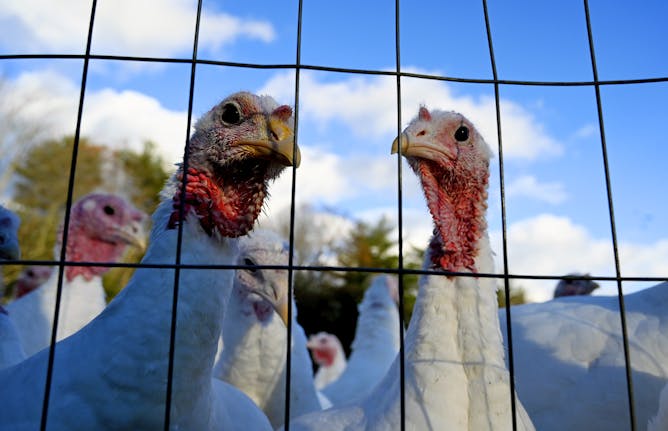|
As Thanksgiving approaches, finding a turkey the right size for your household at a good price could be challenging. On top of inflation that has driven up grocery prices across the board, a nationwide outbreak of avian influenza, also known as bird flu, has led to the culling of more than 50 million turkeys and chickens this year in the U.S.
Holiday dinners aren’t the only concern, as Iowa State University veterinary scientist Yuko Sato explains. While bird flu poses low risk to humans overall – only one person has tested positive for it in the U.S. during this outbreak – the virus is widely present in the wild birds that transmit it. So hunters need to take special precautions in handling game. And the disease can spill over to mammals, so no one should approach an animal that’s acting ill. This outbreak is the latest evidence that human well-being is bound up in all kinds of ways with that of animals.
Also today:
|

Healthy turkeys on a farm in West Newfield, Maine.
Shawn Patrick Ouellette/Portland Press Herald via Getty Images
Yuko Sato, Iowa State University
Hunters are warned to take precautions handling wild birds, and the virus can spill over to non-avian species, so no one should approach wild animals that are appear ill.
|
Environment + Energy
|
-
Rachel Kyte, Tufts University
The biggest issues at COP27 involve financing for low-income countries hit hard by climate change. A former World Bank official describes some promising signs she’s starting to see this year.
|
|
Science + Technology
|
-
Michael Dodge, University of North Dakota
After its fourth delay, the Artemis 1 launch is now scheduled for Nov. 16, 2022. NASA has a history of missing launch deadlines, but the private sector is slowly making launches more reliable.
-
Brian Tarroja, University of California, Irvine
How does flowing water make electricity? An engineer explains hydroelectric generation.
|
|
Education
|
-
Brian Boggs, University of Michigan
The Supreme Court has yet to rule on whether school dress codes are protected under the law.
|
|
Ethics + Religion
|
-
Amy Motlagh, University of California, Davis
The veil as a symbol of oppression has once again moved to center stage in Iran, but it’s important to know about the history of veiling – and mandatory unveiling.
|
|
Economy + Business
|
-
Raymond Hogler, Colorado State University
The country’s reliance on ‘at-will’ employment means that companies face few restrictions when they want to downsize their workforces.
|
|
Health + Medicine
|
-
Jenna Sizemore, West Virginia University
From primary care to cancer screening and insurance coverage, gender-diverse people still face many hurdles to getting good medical care.
|
|
Politics + Society
|
-
Kirsten Matoy Carlson, Wayne State University
A case before the Supreme Court will determine whether a federal law meant to protect Native American children from being forcibly removed from their families is constitutional.
|
|